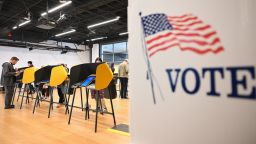In many ways, the 2022 elections were an example of the plane landing safely.
The fallout from former President Donald Trump’s lies about the 2020 election – and the fraud conspiracy theories, hostility towards election officials and promises of combative poll watching activities those falsehoods produced – did not translate into widespread chaos at precincts around the country on Tuesday.
“We’re seeing everybody being adults,” said Kentucky Secretary of State Michael Adams, a Republican. “We’re seeing the candidates be gracious and conceding and admitting they lost.”
Several factors contributed to the mostly drama-free administration of the midterms, according to election officials and voter advocates.
Among them was the clear message election officials in key states sent that disruptions at voting sites would not be tolerated. A federal judge’s ruling that clamped down on some conduct viewed as intimidating outside of Arizona ballot drop boxes during early voting was another shot across the bow.
But it was also the two years of preparations – and lessons learned from the difficulties in responding to disinformation that surrounded Trump’s electoral loss in 2020 – that helped stave off the sort of Election Day confusion that could be exploited to cast doubt on the results.
“One of the things is we had a chance to get prepared for it – everyone did. It came out of nowhere in 2020,” said Chris Harvey, the former Georgia elections director, who is now deputy executive director of Georgia Peace Officer Standards and Training Council.
Counting continues in several key states, and there is still possibility of litigation over the vote, particularly if the margins are thin in Nevada and Arizona – where both the Senate and governors’ races are competitive – or in California, where some House races could determine control of the lower chamber.
While there was little evidence on Tuesday of disputes over voting at the polls themselves, that didn’t stop Trump and his allies who spread lies about the 2020 election from running the same playbook this year over routine issues in places like Arizona’s Maricopa County.
Still, those allegations were a reminder of the way that small administrative hiccups were seized upon to make the baseless sensationalist fraud claims that permeated the 2020 vote.
“The coming days and possible weeks will provide plenty of opportunity for domestic and foreign actors to continue to undermine our elections and manufacture chaos,” said Chris Krebs, a former Department of Homeland Security official who led the agency’s cyber security arm during the 2020 election. “It’ll be a real test of our mental toughness, but I’m much more confident today than I was yesterday in our ability to cut through the nonsense and defend democracy.”
‘This time it wasn’t a surprise’
Those in the election community said the past two years, where election officials were targeted with harassment propelled by false allegations, prepared them to work proactively to dispel those false claims.
“Election officials were acutely aware of the tense environment in which they were operating,” said Nate Persily, an election law professor at Stanford University. “Although their procedures weren’t markedly different (from 2020), they knew they were being scrutinized both by legitimate forces and conspiracy theorists.”
In Georgia, training and coordination between election officials and law enforcement helped them feel confident that they had planned for all contingencies, according to Harvey, whose agency certifies law enforcement in the state.
“When the election officials are more confident, it conveys a sense of calm and ease,” Harvey said, adding that sentiment then travels by “osmosis” to voters and the public.
Claims from election deniers there would be “tons of people out at polls” galvanized people to assist with voter protection work on Election Day, said Suzanne Almeida, director of state operations at Common Cause, a nonprofit government watchdog group.
There were some one-off episodes at polling places Tuesday, such as a man arrested after threatening voters with a knife in a Milwaukee suburb, briefly forcing one polling place to close, though there were no injuries and he was arrested without incident, police said.
At the same time, election deniers appear to have vastly overstated how large of a presence they would be at polling places, Almedia said.

“What we are seeing playing out is a right-sizing of what was purported to be a much more significant threat than ultimately came to fruition,” she said. “Sometimes with tactics like this, the story is the intimidation. It’s about making a movement seem bigger than it is, seems like making a fringe idea feel very mainstream and like it’s everywhere.”
After two years that election-deniers bragged that they would flood the polls with observers to find fraud, those promises did not lead them to producing Tuesday any legitimate evidence of mass fraud at voting sites, said Ben Ginsberg, a retired Republican lawyer, who also praised the work done by election officials to prepare for potential conspiracy theories.
“I think it was a little bit of surprise the way it played it out two years ago and this time it wasn’t a surprise,” said Ginsberg, who now co-chairs the nonpartisan Election Official Legal Defense Network, which gives legal aid to election workers. “A lot of election officials were far more transparent in explaining things, they much more knew what to watch out for.”
‘Like a virus’
Adams, the Republican Kentucky secretary of state, has battled misinformation about elections for months and has seen frivolous open requests and harassment drive local clerks out of their jobs this year in unusually high numbers.
At one point, MyPillow CEO Mike Lindell, a prominent 2020 election conspiracy theorist, took specific aim at Adams, urging his supporters to “bombard” the election chief with public records requests.
But after the FBI seized Lindell’s cell phone as part of an investigation into a Colorado election security breach, the requests and trolling quickly quieted down, Adams said. “I don’t think he lost credibility with the people who follow him, but … when he was neutralized by the FBI seizing his phone, that turned down the heat a bit.”
Lindell has not been charged with any crime.
After months of pre-election tumult, Adams on Wednesday said the election in his state had gone smoothly and candidates and their supporters remained calm.
“I think we dodged a bullet,” Adams said. But he’s concerned the peace might not last.
He noted that a competitive governor’s race will be on the ballot next year as Democratic Gov. Andy Beshear seeks reelection in the Republican-leaning state. And a heated 2024 presidential election looms after that.
“I’ve learned that election denial is like a virus,” Adams said. “You think it’s gone and then some new variant pops up. So, it’s in a dormant stage right now, and I think it will be fine for several months and then come back.”
‘Where is everybody?’
Trump’s allies who vocally spread the former president’s lies about the 2020 election zeroed-in Tuesday on Arizona’s Maricopa County, where a printer issue at several precincts prevented some ballots from being properly scanned.
“They are trying to steal the election with bad Machines and DELAY. Don’t let it happen!” Trump wrote on his social media.
Charlie Kirk, the founder and president of right-wing group Turning Point USA, tweeted a false claim about two-hour wait times in Maricopa County Tuesday afternoon – which the county rebutted in a tweet.
The use of social media to fuel doubts about the vote machines mirrored the tactics from Trump’s supporters in 2020, when they spread wild and baseless claims about alleged fraud involving USB drives and the use of felt-tipped sharpies to fill out ballots that were patently false.
On Tuesday evening, a county judge on denied a bid by Republicans to extend polling hours by three hours because of the voting machine issues, saying there was no evidence the snafu had prevented anyone from voting.
“If people have instances or proof of fraud we want to hear that. But up to this point we have not,” Maricopa Board of Supervisors Chair Bill Gates told CNN’s Wolf Blitzer on Wednesday. “And right now, we are laser focused on getting through this count and doing it in an accurate way.”
Still, that didn’t stop GOP gubernatorial nominee Kari Lake – one of several statewide Arizona nominees who has embraced Trump’s false claims the 2020 election was stolen – from claiming in a speech late Tuesday there could be problems with the results, saying she felt like it was “Groundhog Day.”
In anticipation of protests Tuesday evening, the Maricopa County Sheriff’s Office blocked off the areas where protesters had gathered in 2020 Tuesday evening with seven-foot-tall chain-link fencing. A police helicopter circled overhead, more than a dozen sheriff’s deputies milled around the perimeter of the fencing and a group of officers on horseback periodically rode along Third Avenue.
But the expected protests didn’t materialize. By 10 p.m. local time, just a few people had gathered outside the fence: a white-haired man holding a large American flag and two younger men wearing balaclavas, one in a shirt that read “F–k Antifa.”
That man asked a reporter, “Where is everybody?”
CNN’s Bob Ortega, Sean Lyngaas and Maeve Reston contributed to this report.





